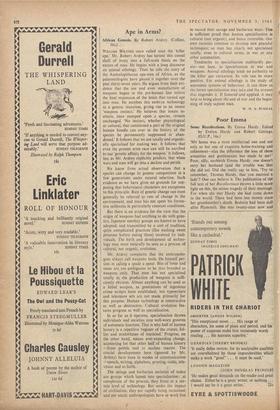Ape in Arms?
WILLIAM BOLITHO once called man the 'killer ape.' Mr. Robert Ardrey has turned this casual shaft of irony into a full-scale thesis on the nature of man. He begins with a long discourse on animal ethology. Then he tells the story of the Australopithecan ape-men of Africa, as the palicontologists have pieced it together over the past thirty-seven years. He argues from their evi- dence that the use and even manufacture of weapons began in the pre-human line before the final expansion of the brain that turned ape into man. He ascribes this embryo technology to a genetic mutation, giving rise to an innate 'weapons instinct.' He believes that innate in- stincts, once stamped upon a species, remain unchanged. 'No instinct, whether physiological or cultural, that constituted a part of the original human bundle can ever in the history of the species be permanently suppressed or aban- doned.' It follows that we are totally and orianic- ally specialised for making war. It follows that even the present arms race can still be ascribed to our 'genetic affinity for the weapon.' It follows, too, as Mr. Ardrey explicitly predicts. that when wars end man will go into a decline and perish.
We know from actual observation that a species can change its genetic composition in a few generations under natural selection. Such evidence as we have gives no grounds for sup- posing that behavioural characters are exceptions to this principle. Rate of genetic change can most generally be referred to rate of change in the environment, and man has not spent his forma- tive millennia in particularly constant conditions.
But there is no evidence for the view that the origin of weapons had anything to do with gene- tics. Japanese monkey gr.oups are known to have adopted, and transmitted by a sort of tradition; quite complicated practices (like washing sweet potatoes before eating them) invented by indi- viduals. The birth and development of techno- logy may most naturally be seen as a process of cultural, not organic, evolution.
Mr. Ardrey complains that the anthropolo- gists always call weapons tools. He himself per- sists in calling a spade a spear. Bits of bone and stone are too ambiguous to be thus branded as weapons only. That man has not specialised totally in the production of weapons is suffi- ciently obvious. Almost anything can be used as a lethal weapon, as generations of ingenious crime writers have established; but typewriters and television sets are not made primarily for this purpose: Human technology is constructive as well as destructive. Cultural evolution fea- tures progress as well as specialisation.
In so far as it operates, specialisation throws individuals and societies into well-worn grooves of automatic function. That is why half of human history is a repetitive 'register of the crimes, fol- lies and misfortunes of mankind.' Progress, on the other hand, means ever-expanding change, accounting for that other half of human history — from pebble tool to nuclear reactor. The crucial developments here (ignored by Mr. Ardrey) have been in modes of communication — speech, writing, alphabets, printing, radio, tele- vision and so forth.
The savage and barbarian societies of today are groups which lapsed into specialisation: ,at completion of the process, they froze at a cer- tain level of technology. But under, the impact of civilisation, they are rapidly being reclaimed, and our social anthropologists have to work fast
to record their savage and barbarian ways. This is sufficient proof that human specialisation is cultural (not organic), and hence reversible. Our own societies continue to develop new peaceful ' techniques; so man has clearly not specialised totally, even in cultural terms, in war or any other automatism.
Tendencies to specialisation stubbornly per- sist—not least, to §pecialisation in war and weapons. Animal ethology lends no authority to the killer ape caricature. Its role can, be more positive. For animal ethology is the study of automatic systems of behaviour. It can show us the forms specialisation may take and the stresses that engender it. If fostered and applied, it may help to bring about the end of war and the begin- ning of truly sapient man.














































 Previous page
Previous page